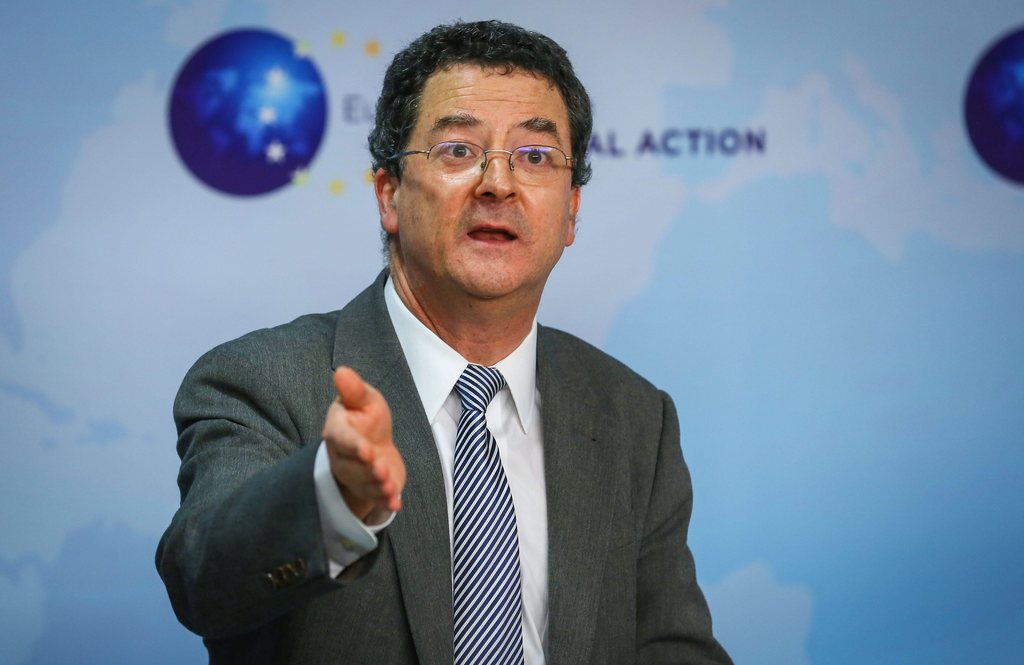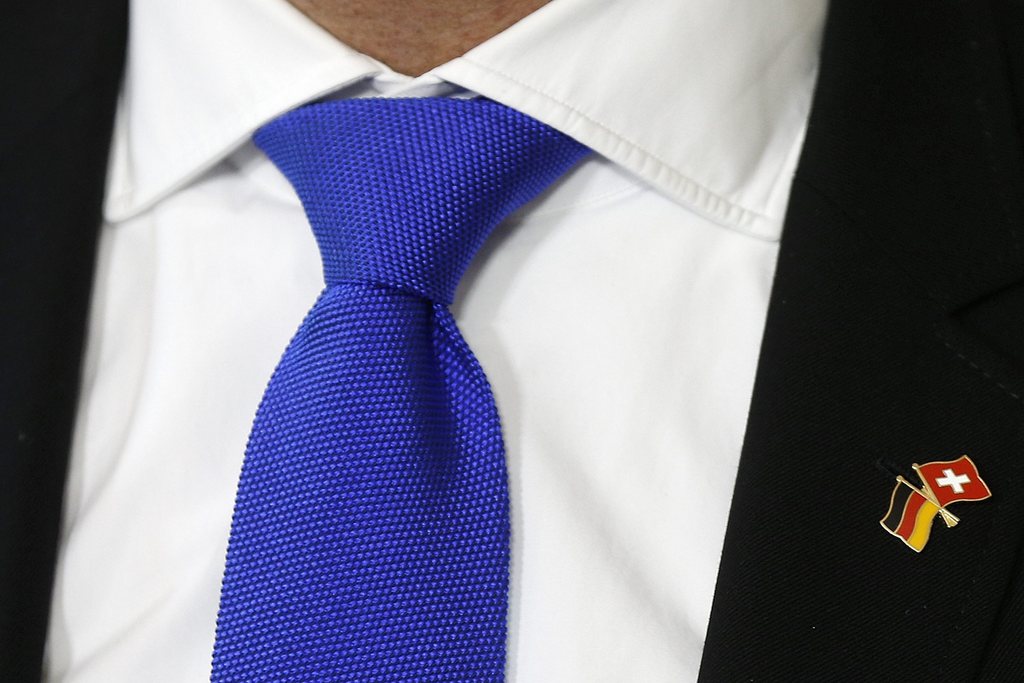‘No pressure to give up our sovereignty’

Switzerland and its most important trade partner, the European Union, have been at odds over the future of their bilateral relations. After years of stalemate the cabinet is shortly due to present the mandate for new negotiations on institutional issues with Brussels.
Yves Rossier, top diplomat and state secretary in the foreign ministry told swissinfo.ch what is at stake for non-EU member Switzerland in the months ahead.
A major controversy has been simmering at a domestic level over the choice of an arbitration panel to settle dispputes between the 28-member bloc and Switzerland.
According to Rossier, Switzerland will retain control and independence after a decision by the European Court of Justice, but it will have to face possible consequences in dealing with the EU.
The Swiss government decided in 1992 to apply for negotiations on EU membership. The application is currently shelved.
The government’s 2006 report on European integration stated that the Swiss policy is based on bilateral treaties.
In August 2010 the government published a report on the country’s European integration policy, which declared that bilateral accords were still the best way to work with the EU, despite increasing difficulties.
Over the years it has concluded 20 major bilateral agreements with the EU. There are also about 100 secondary bilateral accords between Bern and Brussels.
swissinfo.ch: With the media you have the reputation of being an unconventional diplomat who approaches issues very openly and directly. Do you also see yourself that way?
Yves Rossier: Actually, no. But as far as my diplomatic activity is concerned, you’ll have to ask my negotiating partners abroad. An influential British diplomat, Harold Nicolson, once said the most important qualities a diplomat can have are clarity and precision. That’s also what people value.
The image of an elegantly dressed diplomat nibbling on chocolate is a thing of the past.
The daily life of a diplomat is something else completely. It has much more to do with multifaceted discussions and attempts to find solutions. Clarity and precision are of course very helpful in this case.
swissinfo.ch: You’ve now been in your position for 18 months. Were you surprised at the reputation Switzerland has abroad?
Y.R.: No suprises. Switzerland continues to have a good reputation, although we’re masters at belittling ourselves and finding our own faults.
There are also good reasons why we have a good reputation abroad. The quality of our businesses, and the outstanding work we do in development aid, for example. We belong to the countries that are very much present on the ground and not just represented indirectly by international organisations.
The quality of our educational and political systems also is one of our trumps. Even if my counterparts don’t necessarily always know how the ins and outs of the political procedures in Switzerland, they have always shown a keen interest in our political system.
But I also have had to fight against the cliché, mentioned once in a while but not always in all seriousness, that Switzerland harbours tax evaders and launders dirty money.
Setting the record straight is part of what we do.

More
Switzerland and the EU
swissinfo.ch: The cabinet is prepared to negotiate with the EU over institutional issues. Freedom, independence and sovereignty are values that are deeply anchored in the Swiss population. The biggest political party in the country doesn’t want negotiations. Why does the government want to negotiate?
Y.R.: First of all, we’re not negotiating our sovereignty. Being sovereign means being able to do what we think is right. We can do that in any case. The situation with the EU is different. Brussels has built up a functioning market, and the question is whether we want to stand on the sidelines or try not to be left out. That’s a sovereign decision.
We can say we don’t want to be involved, but then there’s a price we have to pay – an economic price. Being sovereign doesn’t mean that I can do what I want, without any consequences.
We’re not under pressure to give up our sovereignty, despite allegations to the contrary in Switzerland and for different reasons.
For example, we could cancel the agreement with the EU on the free movement of people at any time – and accept the consequences. The question is whether it’s in our best interests to revoke it, and I’m convinced that it’s not.
swissinfo.ch: Europe is the biggest economic area for Swiss industry…..
Y.R.: Our interest in Europe is not just economic, but it’s true – we have as much trade with Italy’s Lombardy region as with China; as much with the German state of Bavaria as with Japan, and more with neighbouring Baden-Württemberg than with the United States. But it’s not just a question of trade.
The decisions of the EU and the individual EU member states are in fact political. They affect environmental, social or educational policies, and those are decisions that have an impact on us.
In terms of economics, we’re talking about the exchange worth CHF1 billion ($1.1 billion) per workday. But there’s also a human aspect – with 1.2 million Europeans living in Switzerland we contribute to the mobility of Europe.
Ten per cent of this European mobility affects Switzerland, and the commuters who travel daily to Switzerland make up a quarter of the commuters Europe-wide.
swissinfo.ch: You’re caught in the middle, facing two frontlines. To be exact, between domestic politics – which wants to make as few concessions as possible – and Brussels, which wants an agreement that includes the automatic adoption of dynamic EU law. How much room for manoeuvre do you have?
Y.R.: The EU requires nothing from us. It just alerts us to the fact that there are certain conditions to be met if we want to keep a share in the common market.
The only sector where there is pressure is on tax issues. There, the wind has changed. Of course, we can say ‘no, thank you’, but naturally there are consequences.
As for the common market, it was made clear from the beginning that the existing bilateral accords would not be questioned. But if we want additional agreements over access to markets then we’ll have to discuss the conditions, and we will do that. If we don’t want to, we don’t have to.
swissinfo.ch: But the Swiss government has decided to go that way.
Y.R.: Yes, that’s a sovereign and strategic decision. The cabinet is convinced that the disengagement will increase if we don’t do anything, and that the moment will come when the economic price will be too high. If you wait to negotiate until you’re in a difficult situation, then the negotiations are much more difficult.
Now, in comparison, we’re still in a comfortable situation and can negotiate on an equal footing.
swissinfo.ch: The key point – at least according to the Swiss public – is the question of which body should have the final say in the event of disputes. Under the current proposal, the European Court of Justice is responsible. What exactly falls under its jurisdiction?
Y.R.: Firstly: Disagreements will be decided politically, that is, by a joint committee with both Swiss and EU members. If there are questions about the interpretation of the relevant law in a dispute, the EU Court of Justice would be called on.
The Court of Justice is the only body that can make a decision. It has jurisdiction, just as the Supreme Court has in Switzerland.
We accept the laws of the EU for the accords on market access. This has to do with having a level playing field for everyone. Equal treatment is therefore a precondition for discussions on market access.
The exchange of goods across borders should be as open and free as possible. The rules for the common EU market will be issued in the EU and nowhere else. Either we adopt these rules and have equal treatment, or we don’t.
So, in the case of a disagreement, the one court that has jurisdiction over EU law will be called on and will make a decision. The question of how to solve the dispute will be decided politically in the so-called mixed committee.
This is not a process that necessarily leads to a conviction of Switzerland. Of course what the court says has a great impact, but we have the freedom, if politically necessary, to decide not to accept the interpretation of the EU court. Then we obviously have to take the consequences.
swissinfo.ch: Legal experts have contrary opinions as to the European Court‘s competence and ability to interpret potential decisions. How do you explain these differences?
Y.R.: That’s often the case. We have sketched the outlines of a possible solution. Now we’re developing a mandate, and at the end of the negotiations there will be a result. Then it will be possible to argue about it.
It is difficult to fight now over something that hasn’t yet been defined. The legal experts don’t know what has come out of the negotiations, and they aren’t familiar with the mandate either.
swissinfo.ch: The European Commission’s President, José Manuel Barroso, is considered a friend of Switzerland. He is stepping down in autumn 2014. What kind of schedule for negotiations do you have in mind?
Y.R.: The European elections will also take place next year. It would probably be advantageous if we could conclude the negotiations before the new commission takes office. A new commission would first have to be informed, and that would take time.
Relations between the two sides have been strained for years: whereas Switzerland wants to hold on to the bilateral approach, many in the EU feel that this option has been largely exhausted. The EU wants Switzerland to adopt EU law more quickly, while Switzerland particularly wants to avoid any form of automatism.
Still, both sides want to negotiate a joint approach. In August, for an institutional agreement with the EU, the cabinet approved a mandate for negotiations on an institutional agreement with Brussels.
The key point is that the European Court in Luxemburg should give its opinion in the event of a dispute over the interpretation of bilateral law. But Switzerland, as a non-EU state, does not want to give up its sovereignty.
Opposition to negotiations with the EU comes primarily from the rightwing Swiss People’s Party. There is also criticism from the centre-left Social Democrats who are concerned over insufficient measures to protect workers from low salaries.
The EU considers some of these accompanying measures discriminatory and proof that although Switzerland adopts EU laws, they are not implemented and interpreted as they are in the member states.
When discussions between the EU and Switzerland will commence has not yet been determined, but they are scheduled for next year.
(Translated from German by Jeannie Wurz)

In compliance with the JTI standards
More: SWI swissinfo.ch certified by the Journalism Trust Initiative













You can find an overview of ongoing debates with our journalists here . Please join us!
If you want to start a conversation about a topic raised in this article or want to report factual errors, email us at english@swissinfo.ch.